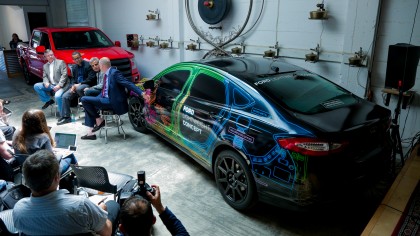
The Ford Fusion, the company's staple sedan, didn't look much different when we saw it Tuesday afternoon. But put it on the scale and one thing was shockingly clear: the Fusion has lost a lot of weight.
It's only a few months old and Ford has already managed to shave 25% off last year's model – effectively making it the same weight as the company's B-class car, the Ford Fiesta.
Significant changes include 19-inch carbon fiber wheels, composite and hollow steel coil springs, carbon fiber seats, chemically toughened windows, and a steep, 40% reduction to the engine block by various means.

Speaking to Kumar Galhorta, vice president of engineering at Ford, we learned that this significant weight reduction will not only allow the prototype to start and stop faster, expend less gas while driving, and, shockingly, even help save the planet.
The concept vehicle will serve as a research platform for future models – inspiring the soon-to-be-released 2014 Ford F-150. There are currently six prototypes made today, four of them will be used for different types of testing (crash and decomposition in harsh environments), while the remaining two will be used for in-house experiments.
Whether this will actually save you money at the pumps remains to be seen, but regardless, it's impressive to see the same technology that goes into spaceships going into our cars. Unfortunately, it could be a few years before we see this car out on the roads, so it's best not to trade in your set of wheels just yet.
Like all great technologies, however, the best is yet to come.
Get daily insight, inspiration and deals in your inbox
Sign up for breaking news, reviews, opinion, top tech deals, and more.
- Interested in cars, eh? Why not check out our hands on with Apple's CarPlay?
Nick Pino is Managing Editor, TV and AV for TechRadar's sister site, Tom's Guide. Previously, he was the Senior Editor of Home Entertainment at TechRadar, covering TVs, headphones, speakers, video games, VR and streaming devices. He's also written for GamesRadar+, Official Xbox Magazine, PC Gamer and other outlets over the last decade, and he has a degree in computer science he's not using if anyone wants it.
